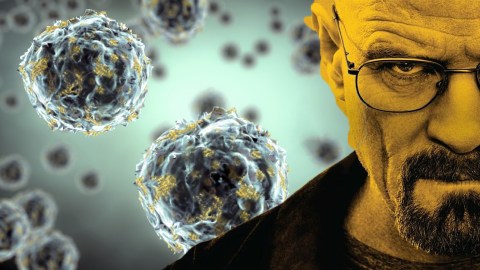Viruses Win Approval as Anti-Cancer Treatment

Earlier this week, the FDA approved the first-ever virus as a medical treatment for melanoma. The strain has the mouthful of a name — talimogene laherparepvec (T-VEC) — but the virus’s debut into the realm of medical science has been long awaited. According to Nature, as far back as the 19th century, scientists noticed that viruses mysteriously shrunk certain tumors and currently in China there is a booming medical tourism industry for the treatment of head and neck cancer with oncolytic adenovirus H101.
So how exactly does virus therapy work? When we get sick from a virus, it invades our bodies and changes the DNA of certain cells, essentially making them zombie cells that do the virus’ bidding. With virus therapy, the same mechanism is at work, except the virus switches off the DNA that is expressing cancer.
While using viruses to treat cancer may sound like science fiction, virology is definitely pushing the boundaries of pathogen study into the realm of fascinating paradox.
What’s fascinating about using virus therapy to cure cancer is the propensity for viruses to cause cancer. In fact, 15 percent of all cancer deaths are caused by a virus, with the most common being human papillomavirus (HPV). What’s even more fascinating is that most of cancer research is done with HeLa cells, or immortal cancer cells that were taken from a woman in the 1950s who contracted the HPV virus.
The strange loops between viruses and DNA point to the growing opportunities in medical research, but also the more nebulous line between virulence and vitality. Already, it is well-known in scientific communities that the genetic disorder sickle cell anemia can prevent mortality in young children who are exposed to the malaria virus. Even stranger is the co-dependence of archaebacteria and viruses deep within the ocean crust, which has even been purported as evidence of life on other planets.
While using viruses to treat cancer may sound like science fiction, virology is definitely pushing the boundaries of pathogen study into the realm of fascinating paradox.
Could deadly viruses’ rapid evolution be turned against them? And could we ever control the pace of our own evolution? Science writer Carl Zimmer explains:
—Daphne Muller is a New York City-based writer who has written for Salon, Ms. Magazine, The Huffington Post, and reviewed books for ELLE and Publishers Weekly. Most recently, she completed a novel and screenplay. You can follow her on Instagram @daphonay and on Twitter @DaphneEMuller.





